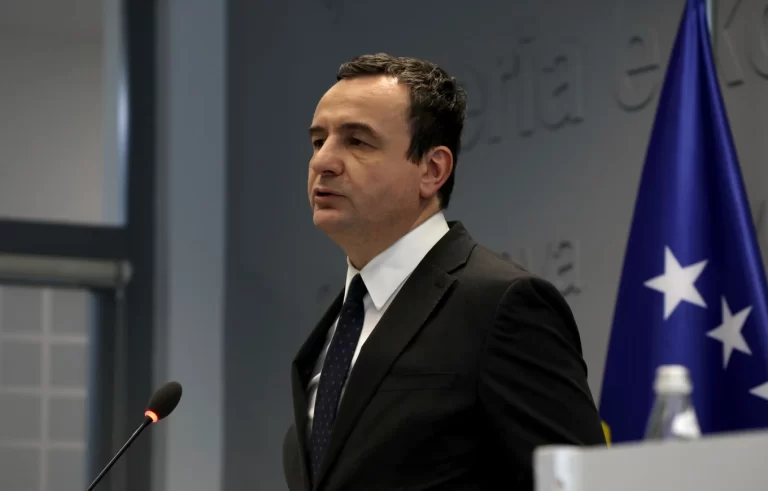Kosovo is entering a dangerous and uncertain political terrain if it fails to make a decision by July 27 to constitute the Assembly. The ex officio decision of the Constitutional Court, issued yesterday, states, among other things, that:
“Any decision and action of the elected deputies of the Assembly of the Republic of Kosovo regarding the Constitutive Session is prohibited after the end of the 30 (thirty) day period, as determined by paragraph 2 of point II of the enacting clause of Judgment KO124/25.
II. TO ORDER that the interim measure enters into force on 27 July 2025, lasting until 8 August 2025.”
The Constitutional Court’s decision came after 52 failed attempts—roughly six months after the parliamentary elections—to constitute the Assembly of Kosovo, an act that would pave the way for forming the Government.
To address the consequences of not establishing the Assembly by the deadline, the President of the Republic of Kosovo, Ms. Vjosa Osmani, filed a preventive request with the Constitutional Court to suspend Judgment KO124/25 if the Assembly is constituted before Saturday. According to President Osmani, the request submitted to the Court does not prejudge the outcome within the remaining timeframe.
Parliamentary elections held in February resulted in the Self-Determination Movement (LVV), led by Albin Kurti, winning 48 mandates. The Democratic Party of Kosovo received 28 mandates, the Democratic League of Kosovo 20, and AAK & NISMA secured 8, with the remaining seats going to minority representatives. However, despite being elected for a four-year term, the deputies have failed 52 times to constitute the Assembly. This ongoing failure has plunged Kosovo into a political crisis, suggesting a lack of will among political parties to resolve the impasse.
Several meetings have been held between LVV and NISMA. However, NISMA, after splitting from its coalition with AAK, now has only three MPs—far from enough to secure the 61 votes required to form a government with LVV. At the core of this stalemate appears to be LVV’s insistence on nominating Albulena Haxhiu, the current acting Minister of Justice, as the Speaker of Parliament. Her candidacy is controversial, as it remains unclear whether the Kurti Government has officially resigned prior to MPs being sworn in under the new Assembly.
Although Albin Kurti has repeatedly claimed that he has the numbers to form a government, the political reality suggests otherwise.
The electoral process itself was plagued by issues, including delays in certifying results, technical failures such as a Central Election Commission server crash, and extensive manual vote counting—all contributing to prolonged delays.
Compounding tensions, shortly after preliminary results were announced, a visibly euphoric Albin Kurti insulted his political opponents, referring to them as “animals.” This inflammatory rhetoric appears to have alienated the opposition, making them unwilling to cooperate in forming a government.
It is worth noting that Kurti had aimed to secure 500,000 votes in the February election—a goal he did not reach. This shortfall seems to have weakened his political leverage. While he has expressed no willingness to compromise, Kurti appears to favor calling for new parliamentary elections in October, coinciding with Kosovo’s local elections.
With time running out, and no clear majority or visible political compromise in sight, Kosovo has fewer than 48 hours left—according to the Constitutional Court’s ruling—to constitute the Assembly. It remains uncertain whether additional sessions will be called by midnight on July 26 to resolve the deadlock, but all signs point toward another round of parliamentary elections.
International representatives in Kosovo have expressed strong disappointment over the 52nd failed attempt to form institutions. They have urged the country’s political leadership to act urgently. British Ambassador to Kosovo Jonathan Hargreaves, in a message posted on X (formerly Twitter), called on Kosovo’s politicians “to unite and find a solution to end the deadlock before the Constitutional Court’s term ends tomorrow. Otherwise, Kosovo is entering uncharted territory and its citizens continue to lose meaningful political representation and the ability to make important domestic and international decisions that affect their lives,” he wrote.
Despite Western expressions of disappointment, there appears to be no substantial pressure this time to push forward the formation of institutions, as seen in previous crises. Kosovo’s political leaders must take responsibility and act with prudence in fulfilling the obligations stemming from the February 9 elections. Otherwise, the country risks entering a political crisis—whether by design or due to sheer numbers. Whatever the cause, this situation jeopardizes democracy in Kosovo. Democracy is not merely a matter of numbers or majority rule; it is a system of governance that includes all legal members of a state, typically represented through elected officials.




